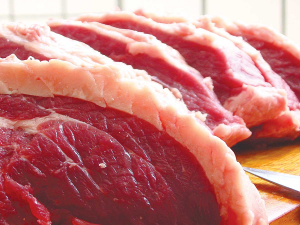NZ scientists make breakthrough in Facial Eczema research
A significant breakthrough in understanding facial eczema (FE) in livestock brings New Zealand closer to reducing the disease’s devastating impact on farmers, animals, and rural communities.
 Research has shown that red meat delivers more of the essential protein building blocks for humans compared to plant-based alternatives.
Research has shown that red meat delivers more of the essential protein building blocks for humans compared to plant-based alternatives.
Meat delivers more of the essential protein building blocks compared to a plant-based alternative.
That’s the findings from a human clinical trial done for the Pasture Raised Advantage research programme to explore the health and wellbeing benefits of eating pasture-raised beef and lamb as part of a balanced diet, compared to grain-finished beef or a plant-based alternative.
The project, which involved researchers at AgResearch, the University of Auckland, Massey University and the Riddet Institute, shows that red meat is probably a better source of protein for the body than highly processed plant-based products promoted as meat alternatives.
In this first of two clinical trials, 30 participants aged 20-34 years were fed breakfast on four different days and their blood, digestive symptoms and mood were monitored for four hours immediately following the meal.
Breakfast was a burrito that contained a single serving of a different protein each day; pasture-raised beef, grainfinished beef, lamb and a plant-based alternative – served in random order to each participant across the four days.
University of Auckland’s Andrea Braakhuis, who heads up the team of nutrition scientists responsible for the study, says they measured the nutrients in the blood of the participants.
It saw a significant difference in the type and amounts of amino acids that come from the digestion of the protein of red meat compared to the protein of the processed meat alternative.
“Amino acids from red meat were of greater biological value and better absorbed by the body,” she says.
AgResearch senior scientist Scott Knowles says the new generation of plant-based meat analogues are formulated to mimic the taste and basic nutrient composition of meat. But he says very little is known yet about their nutritional quality and health benefits.
“Plant-based alternatives are produced very differently from pasture- raised livestock and they’re marketed as having advantages in environmental footprint and sustainability,” Knowles explains. “Those credentials are still being scrutinised. However, we know for certain that NZ farmers are producing a highly nutritious food in one of the most efficient production systems in the world.”
The Meat Industry Association (MIA) is once again looking for game-changing ideas for New Zealand's red meat processing and exporting sector.
Environment Southland is inviting feedback on two bylaws that play a critical role in safeguarding the region's waterways and ensuring the safety of the local community.
While the North Island is inundated with rain, Southland is facing receding water levels as warm weather and lack of rainfall continues.
Entries have opened for the 2026 Fieldays Innovation Awards.
Organisers are expecting another full field of 40 of the country’s top shearers for the popular Speed Shearing event at this year’s Southern Field Days at Waimumu.
The Southern Field Days Innovation Awards have a great record in picking winners and the winner of the 2024 event will be putting up a display to support the event at this year’s show.

OPINION: Meanwhile, red blooded Northland politician Matua Shane Jones has provided one of the most telling quotes of the year…
OPINION: This old mutt has been around for a few years now and it seems these ‘once in 100-year’ weather…